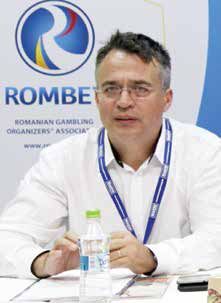Transparency, unity, action
Rombet Articles
ROMBET presents a new episode of the Responsible Gambling series
Within its program dedicated to responsible gambling, ROMBET launches a telephone hotline where a psychologist answers
Ever since its establishment, the Rombet Association was involved in developing responsible gambling programs. While supporting and boosting the actions for creating a public interest foundation dedicated to responsible gambling, Rombet has developed its own program for the education, prevention and counseling of the persons with gambling problems. As other programs in other countries with tradition in this field, the Gambling Organizers Association created an internet page with information on the risks associated with gambling, and for those who feel they crossed (or about to cross) the line of gambling as entertainment, it provides a set of tools to come to their help.
 “Rombet began its collaboration with the psychologist Cristina Anghel and, soon, we will have a dedicated telephone line for all those interested, players with problems or members of their families, or even friends, where they can discuss with her about the gambling problems and they can also make an appointment for two free evaluation sessions.
“Rombet began its collaboration with the psychologist Cristina Anghel and, soon, we will have a dedicated telephone line for all those interested, players with problems or members of their families, or even friends, where they can discuss with her about the gambling problems and they can also make an appointment for two free evaluation sessions.
I would like to point out the fact that we do not see all these projects for a responsible game as a means of competition between different organizations and associations, but as a collaboration opportunity between all those interested in this subject, for the good of the entire gambling industry. We all have – or should have – the same interest, the concern for the players, the social responsibility, the promotion (and maintaining) of the gambling games within the entertainment and socializing area”, said Mr. Dan Iliovici, CEO ROMBET, the expert of the association in the field of responsible gambling.
Mrs. Cristina Anghel, psychologist, lists up the signs that can tell those around a player with gambling problems, or being in the risk area, about the situation that person is in.
“The persons with gambling problems can be very discrete about their gambling activities. Sometimes the family suspects a gambling problem, but isn’t sure.
 The signs of the gambling problems are, mainly, the following:
The signs of the gambling problems are, mainly, the following:
• Unexplainable debts
• Frequent loans, but rarely paid
• Lack of money for daily common expenditures
• Unpaid bills
• Tendency to be secretive
• Unexplained absences
• Lack of interest for family activities
• Bad mood, easily irritable
• Phone calls from angry creditors
Sometimes, the player with problems tells his family members rather what they want to hear than the truth. It is not enough for that person to make a simple promise that he wouldn’t gamble anymore. There must be clear actions standing behind this promise. The person must be helped to open up to his close ones concerning his financial situation. Another step would be attracting the person into family activities, changing the way of living is something to insist upon. The family should also include the addicted person in making the decisions. Furthermore, the family and the friends must act in such a way as to keep the player’s will for change alive. It is important that the family members don’t become overwhelmed by the situation and turn to a specialist in order to find out what is the best solution to get out of the deadlock. The treatment begins once these problems are acknowledged and once there is a will to overcome them”.
Identifying people at risk of developing gambling problems in the early stages of addictive behavior is important, because the chances of recovery are higher and faster in case of early intervention, the experience of those who have approached the field shows.
“It is obviously a lot easier to help a person at risk, in an early stage of gambling problems, than an addict. Unfortunately, it is difficult to achieve early intervention because of the insidious way in which addiction gets settled in.
In order to change his/her gambling behavior, that person has to accept (admit) the fact that he/she has a problem. Regardless of the approach to addiction, the player is the only person who can take the decision to give up the gambling activities. A person with gambling problems can be treated, but this requires not only a psychologist, but also the support of the family, life partner and friends. The treatment involves psychotherapy, programs based on certain steps to take, self-help, support given by the partner, medication, or a combination of these”, explains psychologist Cristina Anghel, partner psychologist of the Rombet Association in projects concerning responsible gambling.
New advice from her, in the next issue. For any suggestion or information on this subject, you can write to office[at]rombet.com.
Article published in Casino Magazine.Tweet
Featured Articles
- › Player Protection in the Spotlight at SBC Summit 2025
- › Responsible Gambling – A New European Perspective
- › ICE provides the platform for Responsible Gambling Trust
- › ROMBET presents a new episode of the Responsible Gambling series
- › Dan Iliovici: “Romania can become an example of good practices in the field of responsible gambling, we must work together and overcome prejudice”
- › Protecting the gamers from the so-called Social Games
- › How Can We Identify A Person With Gambling Problems
- › The national projects dedicated to the Responsible Game begin to be outlined
- › Dan Iliovici on Responsible gambling
- › Gambling as entertainment
